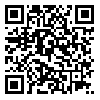BibTeX | RIS | EndNote | Medlars | ProCite | Reference Manager | RefWorks
Send citation to:
URL: http://jhosp.tums.ac.ir/article-1-5891-en.html

 , Sayed Abolfazl Zakerian *
, Sayed Abolfazl Zakerian * 
 2, KHadijeh Adabi Bavil Aliaei3
2, KHadijeh Adabi Bavil Aliaei3 
 , Kamal Azam4
, Kamal Azam4 
 , Abolfazl Aliari5
, Abolfazl Aliari5 

2- Associate Professor, Department of Occupational Health Engineering, School of Public Health, Tehran University of Medical Sciences, Tehran, Iran, (*Corresponding author), Email: zakerian@tums.ac.ir
3- Assistant Professor, School of Medicine, Tehran University of Medical Sciences, Tehran, Iran
4- Associate Professor, Department of Epidemiology and Biostatistics, School of Public Health, Tehran University of Medical Sciences, Tehran, Iran
5- Phd Student in HealthCare Administration, Azad University of South Tehran, Tehran ,Iran
Background:Human reliability assessment consists ofusing quantitative and qualitative methods to predict human contribution to the occurrence of error;so, using reliability assessment techniques is necessary to prevent and limit the consequences of errors in sensitive work environments.Healthcare considers as the high-risk areas.With due attention to the high rates of cesarean section in Iran, this study aimed at evaluating human reliability during this operation.
Materials and Methods:This was a qualitative-descriptive study which was performed as a cross-sectional one using the EMEA technique. At first, the process of operation was divided in to tasks and sub-tasks using the method of hierarchical task analysis. Then, according to the EMEA instructions, the work sheet was completed for all personnel in the operating room.
Results: A total of 126 errors, including 40 errors (31.75%) related to circular nurse activities, 34 errors (26.98%) related to anesthesia activities, 33 errors (26.19%) related to scrub nurse activities and 19 errors (15.08%) related to the activities of the surgeon, were identified.In general, skill-based errors (51.59%) and judgment-based errors (1.59%) were the highest and the lowest amount, respectively.
Conclusion:According to the study results, among three working groups, skill-based errors forcircularand scrub nurses and anesthesiology expert with the most frequency, and knowledge-based errorsfor surgeon tasks, with the highest frequency should be considered as priorities tocontrol errors.
Received: 2017/10/18 | Accepted: 2017/12/23 | Published: 2018/01/23
| Rights and permissions | |
 |
This work is licensed under a Creative Commons Attribution-NonCommercial 4.0 International License. |



